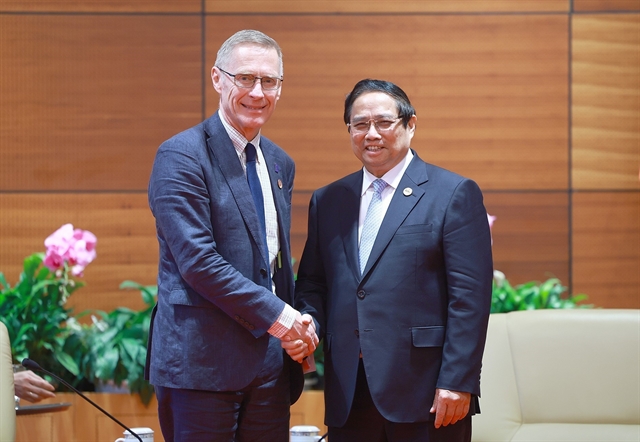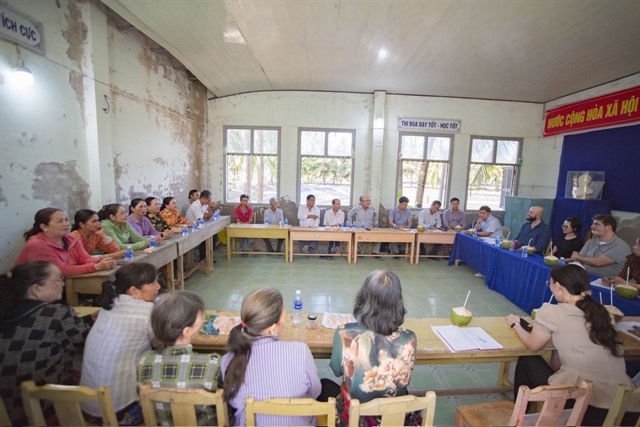 Economy
Economy

 |
| The evaluation team, led by Mr. Paolo Silveri, at a community meeting at an IFAD project site in Ben Tre. — Photo courtesy of IFAD Vietnam |
HÀ NỘI — Vietnam’s journey toward rural transformation has reached a critical turning point, according to a report.
This week, the Independent Evaluation Office (IOE) of the International Fund for Agricultural Development (IFAD) presented its preliminary findings from the Country Strategy and Programme Evaluation (CSPE) for Vietnam.
Spanning more than a decade of collaboration from 2012 to 2024, the findings outline a roadmap for advancing rural development through innovative partnerships and targeted investments.
The evaluation assessed 11 investment projects across 15 provinces, showcasing the significant progress Vietnam has achieved with IFAD’s support.
"Our initial evaluation shows tangible improvements in local and regional economies where IFAD intervened. There is a clear and measurable increase in household incomes and significant poverty reduction in these areas," emphasised IOE lead evaluator Paolo Silveri, highlighting the programme’s impact.
Among the most notable achievements are infrastructure enhancements that have profoundly affected rural communities. Over the evaluation period, IFAD-supported initiatives constructed 652km of roads, established 89 irrigation systems, and improved water supplies for more than 395,000 households. These investments have empowered farmers to access markets more efficiently, enhancing agricultural productivity.
"Infrastructure such as roads and irrigation systems have been game-changers for farmers, helping them improve their livelihoods and better connect with market opportunities," Silveri added.
Speaking during a meeting with the evaluation team in Ben Tre Province, Vice Chairman of the Provincial People’s Committee Nguyen Truc Son commended the contributions of the International Fund for Agricultural Development (IFAD).
He stated, "Through three project phases, IFAD has greatly enhanced the capacity of local governments to develop socio-economic plans and market-oriented initiatives with the active participation of our people. These projects have also supported sustainable poverty reduction and piloted critical rural infrastructure improvements."
He emphasised the importance of conducting in-depth discussions and surveys with local residents, businesses, and project models that are still in operation or have been handed over to communities.
 |
| Mr. Paolo Silveri, lead evaluator of IOE (center), with the evaluation team at the Vietnam Ministry of Finance. Photo Hoang Pham |
Empowering women through financial inclusion
IFAD’s programmes also triggered significant progress in empowering rural women. Through inclusive financial services, such as Savings and Credit Groups, women have gained greater financial literacy and confidence, allowing them to take on stronger roles in their households and communities.
"Many women have become financially independent and more influential in decision-making, which has significantly contributed to better livelihoods in their families and communities”, said Silveri.
Another standout achievement has been IFAD's focus on climate change adaptation. The evaluation highlighted the successful introduction of resilient agricultural practices, efficient water management systems, and other innovations that have bolstered food security and environmental sustainability.
Future Challenges and Opportunities
While the results of the evaluation will only be conclusive in the evaluation report, that will be shared with Government in July-August 2025, the evaluation’s preliminary findings were very promising.
On the other hand, the evaluation also underscored pressing challenges. Adapting to the rapid impacts of climate change, particularly in regions like the Mekong Delta, remains a critical concern.
Addressing these issues will require strategic planning, focused investments, and stronger collaboration between IFAD and the Vietnamese government.
Furthermore, national and international transformations will require both Vietnam and IFAD management renewed efforts to secure fruitful cooperation in future, while securing progress made so far.
"The challenges we face are complex, but they also offer opportunities to innovate and lead the way in sustainable rural development”, said Mr. Silveri. “The Vietnamese government and IFAD went a great length in forging a successful partnership in the past and they have all it takes to adjust it as needed, to achieve even better results while tackling current and emerging challenges”.
Partnership for the future
Deputy Director General of the Department of Debt Management and Foreign Economics at Vietnam's Ministry of Finance, Nguyen Thi Dieu Trinh, praised the collaboration with IFAD, underscoring its alignment with the country’s rural development goals.
"The partnership with IFAD has been instrumental in supporting our poverty reduction and rural development strategies. As Vietnam continues to streamline its administrative processes, we are committed to creating even stronger conditions for future cooperation”, she said.
Ambrosio Barros, IFAD Representative and Head of the Mekong Multi-Country Office, echoed the importance of building on this foundation: "Our collaboration has created resilient and inclusive rural economies. Looking ahead, we aim to scale up these successes, address emerging challenges, and ensure lasting progress for rural communities."
The evaluation process will continue in the coming months, offering further insights to shape the next phase of IFAD’s partnership with Vietnam./.




